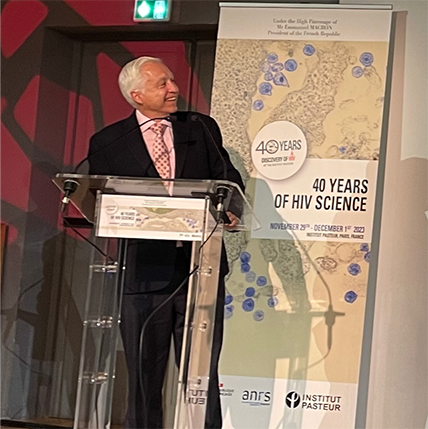 J. Victor Garcia-Martinez, Ph.D.In a groundbreaking presentation at the recent 40 Years of HIV Science conference held at the Pasteur Institute in Paris, J. Victor Garcia-Martinez, Ph.D., professor and Chair of Microbiology, explored the crucial role of resident microbiota in the acquisition and pathogenesis of two human-specific pathogens: Human Immunodeficiency Virus (HIV) and Epstein-Barr Virus (EBV).
J. Victor Garcia-Martinez, Ph.D.In a groundbreaking presentation at the recent 40 Years of HIV Science conference held at the Pasteur Institute in Paris, J. Victor Garcia-Martinez, Ph.D., professor and Chair of Microbiology, explored the crucial role of resident microbiota in the acquisition and pathogenesis of two human-specific pathogens: Human Immunodeficiency Virus (HIV) and Epstein-Barr Virus (EBV).
Garcia-Martinez emphasized the significance of resident microbiota, the microorganisms naturally inhabiting the human body, in driving the progression of HIV and EBV infections.
The title of his presentation, "Resident microbiota is a major driver of the acquisition and pathogenesis of HIV and EBV," succinctly captures the essence of his research.
Addressing the limitations of using germ-free (GF) mice as the gold standard for studying microbiota's role in health and disease, especially with human-specific pathogens, Garcia-Martinez and his team developed a groundbreaking model using GF humanized mice.
This model provides a more accurate representation of the human immune system. Using both GF-humanized mice and conventional (CV)-)-humanized mice colonized with resident microbes, the researchers comprehensively assessed microbiota's impact on EBV and HIV acquisition, replication, and pathogenesis, revealing remarkable findings.
The study unveiled the pivotal role of resident microbiota in enhancing the establishment of EBV infection and subsequent tumorigenesis, providing profound insights into the mechanisms behind the development and progression of EBV-related diseases.
Garcia-Martinez's research also highlighted that resident microbiota significantly increased mucosal HIV acquisition and replication. In CV-humanized mice, oral and rectal HIV acquisition rates were 300% and 200% higher, respectively, compared to their GF counterparts. Notably, HIV-RNA levels in plasma were up to 34-fold higher, and in tissues, they exceeded 1,000-fold higher in CV-humanized mice.
Garcia-Martinez provides insights from the conference, emphasizing the significance of this meeting, the key learnings acquired, and the positive outcomes in applying this knowledge to advance the UAB Department of Microbiology.
Q: Could you elaborate on the importance of the conference you attended in Paris last week and its relevance to your work?
Even after four decades, HIV remains a global public health challenge, claiming the lives of over 40 million individuals. A pivotal moment occurred with the discovery of the AIDS-causing virus by researchers at the Pasteur Institute in Paris 40 years ago. This conference highlighted the significance of this important discovery, leading to the Nobel Prize in Physiology and Medicine awarded to Drs. Francoise Barre-Sinossi (who was present at the event) and Luc Montagnier.
The event also highlighted the progress made in developing life-saving treatments over the years, saving millions of lives. Additionally, it showcased advancements in the pursuit of an effective vaccine and innovative approaches aimed at curing AIDS and ending the pandemic.
Q: In what ways do you envision integrating the knowledge gained in Paris into the ongoing work of the Department of Microbiology?
The conference was truly inspiring for me. Hearing Dr. Tony Fauci and Dr. Barre-Sinossi describe the entire epidemic’s history, from the beginning until now, was a remarkable experience. My objective is to cultivate in our students and trainees a heightened spirit of discovery, mirroring the pioneers of 40 years ago. With new challenges emerging daily that impact us all, it is crucial to build a resilient workforce of well-trained scientists and educators capable of meeting the forthcoming challenges.
Q: Were there any notable collaborations or networking opportunities at the conference that may benefit our department's research initiatives?
This was one of the first opportunities to meet some of the leading scientists in the world of HIV/AIDS research in person. It served to rekindle friendships and to establish new collaborations with scientists from different parts of the world. UAB is home to a thriving community of HIV researchers, covering essential clinical aspects, particularly in the realm of HIV prevention. The opportunity to discuss new opportunities to collaborate and to develop new research programs holds significant value for both our department and the institution as a whole.
Learn more about “40 Years of HIV Science” at the Pasteur Institute.